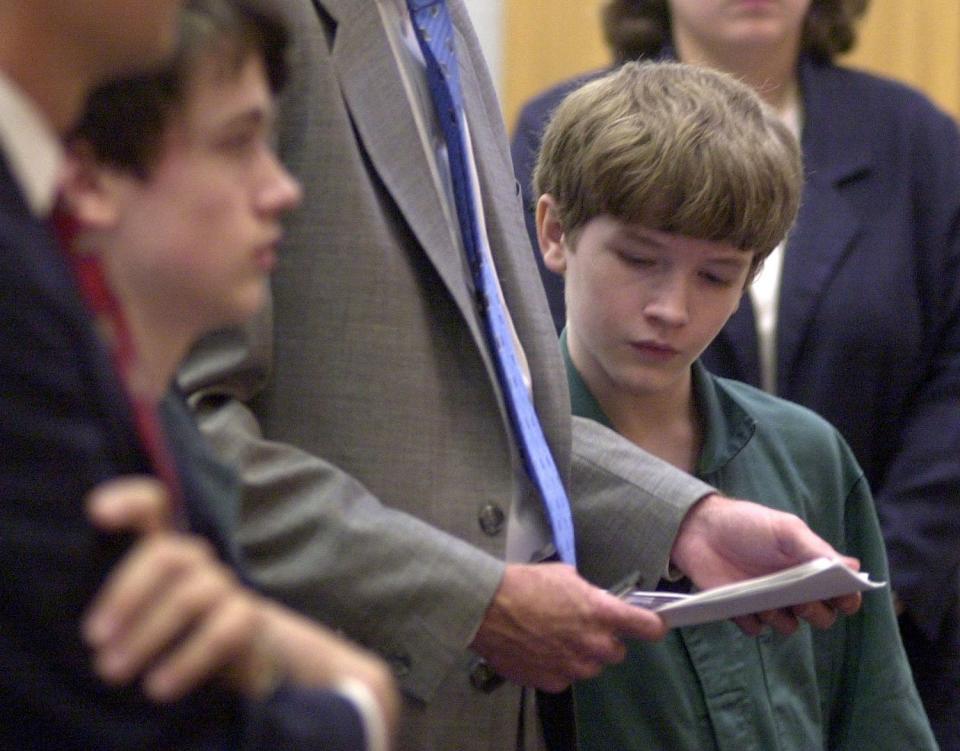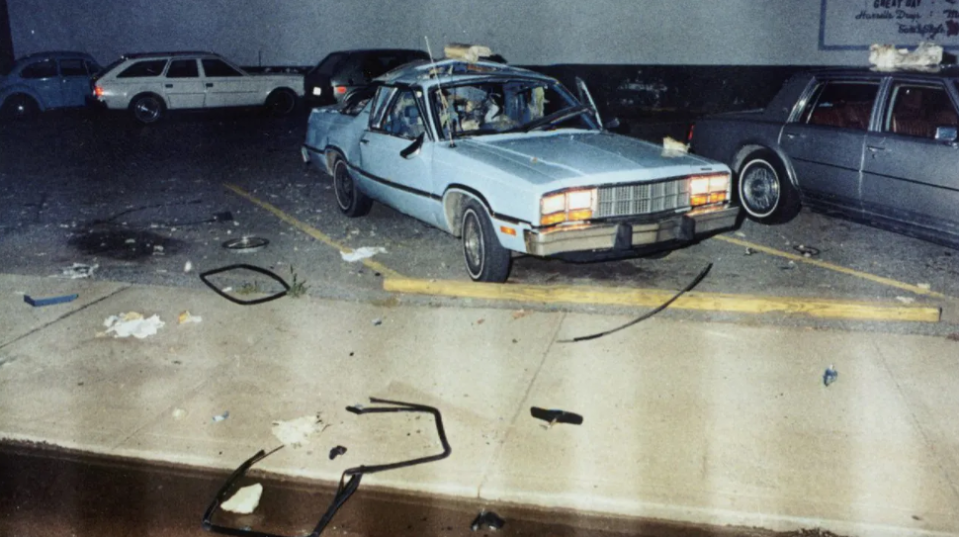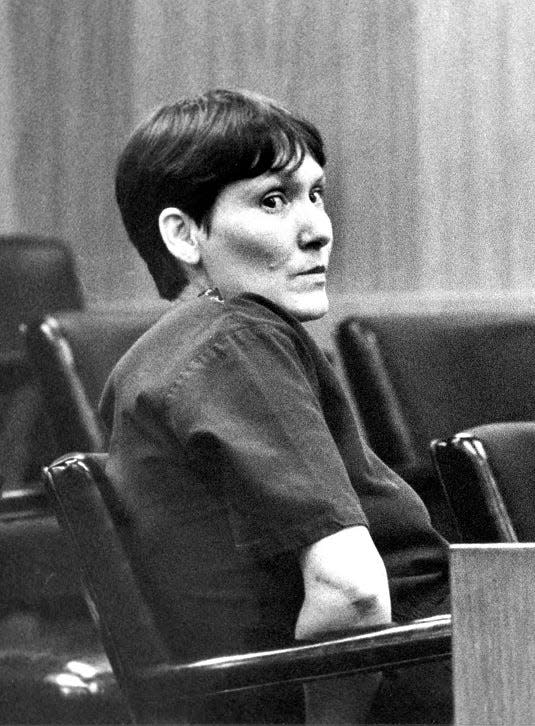Pensacola area no stranger to true crime spotlight. Here's 5 of the most infamous murder cases.
One of Pensacola’s most notorious killers, Judy Buenoano, will be featured in a new true crime documentary on Investigation Discovery. Very Scary People with host Donnie Wahlberg will feature a two-hour documentary on The Black Widow. It’s scheduled to run on Mother’s Day at 8 p.m. CST/9 p.m. EST.
Her methodical murders have made headlines around the world, but Buenoano’s case isn’t the only one that stands out in Northwest Florida. Here’s a look at Pensacola’s top five most memorable crimes.
Black widow: "Very Scary People" on ID features Pensacola's Black Widow killer Judy Buenoano
Billy Boyette and Mary Rice murder spree
For more than a week William "Billy" Boyette and his girlfriend Mary Rice had all of Northwest Florida on edge as they carried out a string of robberies and murders along the Gulf Coast that culminated with Boyette taking his own life during a police standoff in Georgia.
Rice and Boyette's crime spree began Jan. 31, 2017, when Boyette killed two women, Alicia Greer and Jacqueline Moore, at the Emerald Sands Inn in Milton. Investigations later revealed Boyette and Greer had a turbulent, on-again-off-again relationship, and that he shot Greer because he thought she had stolen drugs and money from him.
'I did meet a true monster:' Mary Rice's jail letters shed light on first months in jail
On Feb. 3, the pair killed Peggy Broz, of Lillian, Alabama, in front of her home in an attempt to steal her vehicle.
On Feb. 6, the couple assailed Kayla Crocker at her Beulah home and stole her car, which was later found outside a motel room in West Point, Georgia. Crocker was taken to the hospital with gunshot wounds but died the next day.
Then on Feb. 7, police surrounded the Georgia motel room where Rice and Boyette were staying. Rice eventually surrendered, and Boyette was found deceased from a self-inflicted gunshot wound to the head.
At her trial, Rice claimed that Boyette had forced her to participate in the crime spree against her will through acts and threats of physical violence. However, prosecutors presented evidence to the jury that Rice provided "maintenance, assistance and aid" to Boyette through purchasing maps and camping gear, refueling vehicles and generally helping him evade capture.
Rice was sentenced to life in prison Sept. 28, 2018, for first-degree murder and accessory after the fact to first-degree murder.
The King brothers
In 2001, another murder within a local family made headlines.
Alex King and Derek King were 12 and 13 respectively when they beat their father, Terry King, to death with an aluminum bat as he slept in a recliner inside their Cantonment home. The boys then set the home on fire and fled to the home of a convicted child sex offender whom they had befriended.

At the time, the boys reportedly told investigators they killed their father because they were planning to run away and were worried about being punished. Though the boys claimed they had suffered abuse at the hands of their father, when pressed they described the abuse as mostly spankings and "intense stares."
The children often sought refuge at the home of Ricky Chavis, who according to the Kings allowed them to hang out at his home and smoke marijuana. Following the homicide, he helped the boys lay low for a few days and assisted them in hiding evidence. He was ultimately arrested as an accessory to murder.
King brothers: What drove boys to kill father?
Though Alex made statements that he had a sexual relationship with Chavis and corrections officers found a "love letter" to the 12-year-old in Chavis' cell, prosecutors never found enough evidence to prosecute any charges of a sexual nature.
Because of their age and indications they had been manipulated by Chavis, Alex and Derek were sentenced to seven and eight years incarceration respectively. They have since been released.
Chavis is currently serving a 30-year sentence for false imprisonment of a minor, being an accessory to murder and obstructing an investigation.
The Cormier brothers
Another local incident that made national news was a killing that seemed made for a TV movie.
Sean Dugas, a former News Journal reporter, was killed by a pair of twin brothers who stole his collection of valuable trading cards and buried his body in their father's Georgia backyard.
Dugas had been friends with Christopher and WIlliam Cormier for years before the homicide, and group often got together to play the card game "Magic: The Gathering." Dugas' cards were valued at more than $100,000, and prosecutors said a cash-strapped William hatched the plot to kill Dugas and steal his collection.
Dugas was beaten to death with a hammer, then stuffed into a plastic storage bin. To cover their tracks, the twins rented a U-Haul, loaded up Dugas' body and belongings and told neighbors that they were helping the victim move away.
Who was Sean Dugas? Sean Dugas remembered ahead of trial in his death
The Cormiers reportedly threw away most of the furniture and sold off parts of the card collection piecemeal to collectors around the south. The brothers then went to their family home in Winder, Georgia, and buried the storage bin in the backyard.
After Dugas was reported missing, investigators went to visit the Cormiers because they were among the last to see the man alive. After noticing freshly disturbed ground on the property, officers eventually got a warrant and found Dugas' remains.
In court, the twins pointed the finger at each other, but evidence showed that William had rented the truck and purchased most of the materials used to hide the body and clean up the crime scene.
William was convicted of first-degree murder and sentenced to life in prison. Christopher was found to be an accessory to murder and sentenced to 15 years.
The 'humdinger': Billings family murder
Leonard Patrick Gonzalez Jr. told his accomplices there was $13 million inside a safe in the Beulah home of Byrd and Melanie Billings.
Lured by the promise of a big score, five men donned black "ninja garb" and broke into the couple's rural residence on July 9, 2009. The Billings shared the home with numerous adopted children with special needs, some of whom were in the home when Gonzalez shot the couple "executed-style."
The intruders did get away with a safe that night, but it contained only documents, children's medicine and costume jewelry. A second safe — which contained about $12.85 million less than Gonzalez estimated — was left in the house untouched.
pnj.com/story/news/2014/07/05/billings-murders-destroy-family/12256349/
What happened next? Billings murder doesn't destroy family
Court case: Mastermind behind Billings murder case loses appeal but could still avoid execution
Getaway drivers sped the crew away from the scene and dumped the guns used in the robbery. Eventually the stolen safe was found buried in the backyard of an accessory, Gulf Breeze resident Pamela Long Wiggins.
The case drew coverage from all over the world, with Sheriff David Morgan famously calling the case "a real humdinger."
Eight people ultimately received prison sentences in connection with the case, with Gonzales being handed the death penalty.
In 2015, both Long Wiggins and Gonzalez's father, Leonard Gonzalez Sr., died of health issues while incarcerated.
The Billings' elder daughter cared for her adopted siblings.
The Black Widow
Car bombs are usually a tool of militants and mafiosos, but prosecutors said a Gulf Breeze woman used one in an attempt to blow up her boyfriend outside a downtown Pensacola restaurant in 1983.

The explosive murder attempt alone would make the case of Judias Buenoano sensational, but by the end of the ensuing investigation attorneys tied Buenoano to the murder of a previous husband, a Colorado boyfriend and her own 19-year-old son.
Black widow: "Very Scary People" on ID features Pensacola's Black Widow killer Judy Buenoano

Before the car bombing, Buenoano's boyfriend John Gentry started experiencing nausea and vomiting when she began giving him a daily "vitamin C" pill. Chemists determined the pills contained paraformaldehyde, a potent toxin, and investigators eventually learned that Buenoano had taken out a $510,000 insurance policy on his life.
The case prompted officials to exhume the body of Air Force Sgt. James Goodyear, a former spouse of Buenoano's who died of a strange illness a few months after returning from Vietnam in 1971. Forensic pathologists found evidence of chronic arsenic exposure in his system, as well as in the body of another of Buenoano's deceased boyfriends, Bobby Joe Morris.
Buenoano was also charged and convicted in the 1980 death of her son, Michael Goodyear. Michael suffered paraplegia and wore leg braces, and prosecutors said Buenoano took him onto the East River in Milton in a canoe and pushed him overboard.
Buenoano's husband and son carried more than $170,000 in life insurance.
The black widow was ultimately convicted of both of the Goodyears' murders, as well as the attempted murder of Gentry.
She died in the electric chair in 1998, and was the first woman executed in Florida in more than a century.
This article originally appeared on Pensacola News Journal: Judy Buenoano Billy Boyette among infamous Florida murder cases

